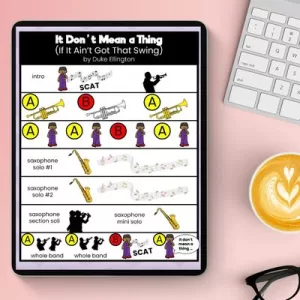I love Halloween! I think it is my favorite to celebrate in the classroom, because there is such great material out there. Danse Macabre by Camille Saint-Saens is one of those classic programmatic pieces that fits perfectly with Halloween time. I love to use it to focus on legato and staccato, since there are two main themes and one is legato and the other is staccato.
Part One: Introducing the Song
I read the poem that the song was based off of:
Zig, zig, zig, Death in cadence, Striking with his heel a tomb, Death at midnight plays a dance-tune, Zig, zig, zig, on his violin. The winter wind blows and the night is dark; Moans are heard in the linden-trees. Through the gloom, white skeletons pass, Running and leaping in their shrouds. Zig, zig, zig, each one is frisking. The bones of the dancers are heard to crack- But hist! of a sudden they quit the round, They push forward, they fly; the cock has crowed.
Then I tell them there are to main themes: the skeleton and the ghost theme. This year, I picked up the main rhythmic motives from each theme, to have my kids get some practice with note reading.
We listen to the song and tap the rhythms on our body while audiating the rhythmic syllables (think the syllables internally). I stop the recording at the beginning of the canon section. We are saving that for another day.
Part Two: Learning Legato and Staccato
At this point, I introduce the words legato and staccato. We determine which section is legato and which is staccato. Then I have the students think of a legato movement for the ghost section and a staccato movement for the skeleton section. We move around the room showing legato and staccato. Again, I stop the song at the canon.
Let’s Learn the Whole Thing
I re-read the poem to them. Then, I start the recording and we follow along on a listening map. My listening map is available here (along with some songs for other holidays); Holiday Listening Map Bundle at TeachersPayTeachers.
We listen for the clock chiming twelve at the beginning, death tip-toing out and starting up his violin (this is also a great time to review the word INTRODUCTION with your students). We listen for the sound of the wind played by the violins and the cock crowing (played by the oboe), and the two final coffins slamming shut at the end.
One of the goals for my fourth graders is to argue the MOOD of a song and back it up with evidence from song using music vocab. This song is great a setting a mood, so it is a great one to have a conversation about how different musical elements can create that mood.
Put It All Together
Adding movement to what we’ve heard. Teacher gets to play Death on his violin. All students start lying on the ground. Teacher tip-toes out and pretend to play violin. Students rise and move legato and staccato during the different sections. During the canon, have students divided into groups. They get to start moving when their number starts in the canon (I usually cue them with my fingers). During the wind part, we are trees and we move like the wind. There’s a big crazy part in the middle and the kids get to make up their own movement during that part. We all freeze when the rooster crows and fade back to our graves (wherever they were lying at the beginning of the song).
Other things you might like:
Sing It High, Sing it Low: Learning SATB through song and Orff instruments









0 Responses